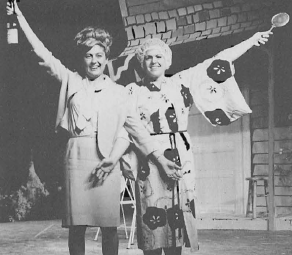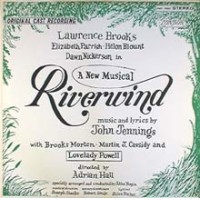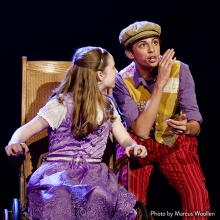Filichia Features: Go Back to Riverwind
Filichia Features: Go Back to Riverwind
 “Exciting New Musical 1963.”
“Exciting New Musical 1963.”
So said the circular yellow sticker that London Records pasted on the cover of every original cast album of Riverwind.
Actually, if we’re going to get technical about it, Riverwind was really “Exciting New Musical 1962.” It opened off-Broadway 50 years ago last week, as you know for all the celebratory parties you attended to commemorate the Dec. 12, 1962 opening.
All right, there probably weren’t any parties to mark Riverwind’s golden anniversary. But this smart little musical still has a good deal of life in it, as I witnessed five years ago at Seton Hall University n South Orange, New Jersey.
Riverwind takes place in a rustic Indiana town where the river flows and the wind blows. (That answers your first question: Riverwind’s third syllable is a noun that’s pronounced as the last word in Gone with the Wind, and not a verb, as in “I must wind my watch.”)
 It’s the name of a small bed-and-breakfast where the occasional tourist lands. Mrs. Farrell and her teenage daughter Jenny run it, with a little help from their teen assistant John. He’s got a big crush on Jenny, but she sees him merely as the boy next door. Jenny, like so many people in rural towns, believes that the Big City is where she should be, so anything involving “next door” doesn’t appeal to her.
It’s the name of a small bed-and-breakfast where the occasional tourist lands. Mrs. Farrell and her teenage daughter Jenny run it, with a little help from their teen assistant John. He’s got a big crush on Jenny, but she sees him merely as the boy next door. Jenny, like so many people in rural towns, believes that the Big City is where she should be, so anything involving “next door” doesn’t appeal to her.
Among tonight’s registered guests are Louise and Fred. Seventeen years ago, they spent the first night of their honeymoon here. In the intervening years, their marriage has gone stale. Louise now hopes that a metaphorical trip back in time might recapture the good feelings they once had. Fred knows that regaining love is more complicated than just returning to a place where they once were happy.
But Fred will fall in love again. Too bad the object of his affection won’t be Louise; it’s Jenny, who’s smitten, too. Ah, the lure of the sophisticated older man who's been to Paris – or at least he claims he has.
Renting the room next door are Virginia, a not-very-successful actress, and Burt, who’s working on his dissertation – as he has been since 1955. He’s given Virginia a very different kind of seven-year itch, in that she’s itching to get married. Burt won’t head to the altar until he’s finished writing.
And why hasn’t he? Too bad that 42 years would have to pass before Liz Tuccillo and Greg Behrendt would write He’s Just Not That into You. The book might have saved Virginia a lot of heartbreak.
In writing Riverwind, John Jennings attempted a musical theater quadrathlon: he would not only create book, music and lyrics, but he would also dare to create an original musical. Even when Frank Loesser undertook The Most Happy Fella, he worked from an existing play.
Was Jennings blissfully ignorant of what a Herculean task he was creating for himself? Whether he was or wasn’t, he came up with one of the first off-Broadway musicals to run more than a year – and one with a terrific score.
 There’s almost an Aaron Coplandesque feel to the title song that Jennings gave Louise. The Great American Theme – Return to Nature – can actually be felt when she sings how she’s been telling herself “Go back to Riverwind.”
There’s almost an Aaron Coplandesque feel to the title song that Jennings gave Louise. The Great American Theme – Return to Nature – can actually be felt when she sings how she’s been telling herself “Go back to Riverwind.”
Early on, young Jenny sings "I Want a Surprise," a song that immediately gets you on her side and makes you root for her. Nice, too, that the orchestral section of the song uses Dixieland music – arguably the best genre to suggest good times, which Jenny desperately desires.
That Jenny is interested in Fred makes him feel younger – and older. Hence, “The Wishing Song” has Fred wishing he were indeed younger. John sings, too, expressing his wish to be older. What kid can’t relate to that? On the other hand, every adult who wants to be younger will still remember when he was a youth and wanted to be older. When will we ever learn to be happy with the age we’re now experiencing?
Quaint as it may seem, Riverwind was daring for an early '60s musical. For one thing, it established that Virginia and Burt were living together, which men and women didn’t often do in those times. As a result, you’re well-advised to do it as a period piece.
Still, in an era in which homosexuality was rarely mentioned in serious plays, let alone musicals, Riverwind was brave enough to acknowledge it twice. First: Virginia and Burt assess the bad marriages they see around them, causing her to mention one unhappy couple that they know: "She likes men,” Virginia notes, before drolly adding, “and so does he."
Much later in the show, when Louise is taking stock of her own miserable marriage, she considers divorce, but fears that a good replacement man would be hard to find. “How many men would be living with their mother?” she asks, before facing another reality: “How many would be living with each other?"
 These lyrics occur in an ambitious musical piece called "A Woman Must Think of Such Things." One suspects that Jennings was inspired by Rodgers and Hammerstein's "Soliloquy" from Carousel. No, he didn't eclipse it or even approach matching that work of art, but Jennings nevertheless captured the emotions that a woman feels when she examines her romantic past, present and future. Many of Louise’s perceptions are the same we hear from women today when they weigh their current relationships and ponder new ones. Is a man in hand worth two on the Internet dating sites?
These lyrics occur in an ambitious musical piece called "A Woman Must Think of Such Things." One suspects that Jennings was inspired by Rodgers and Hammerstein's "Soliloquy" from Carousel. No, he didn't eclipse it or even approach matching that work of art, but Jennings nevertheless captured the emotions that a woman feels when she examines her romantic past, present and future. Many of Louise’s perceptions are the same we hear from women today when they weigh their current relationships and ponder new ones. Is a man in hand worth two on the Internet dating sites?
Truth to tell, one character does seem terribly uninformed by 21st century standards: Mrs. Farrell, to whom Jennings didn't even bother to give a first name. Mothers, he seems to be saying, don’t require one.
The mother in Working mourns that she's "just a housewife," but Mrs. Farrell couldn't be happier or prouder that she can "Sew the Buttons On," as her confident waltz is named. She’s equally triumphant when she says that she can "sweep the kitchen out” and “bake a cherry pie."
Waltzes are Jennings’ specialty. The equally excellent “Pardon Me While I Dance” will ask your Fred and your Jenny to dance elegantly. The song also demands that Jenny show a deft coloratura, so make certain in advance that the actress you’re leaning towards casting can handle these intense vocal requirements.
Mrs. Farrell isn't so far gone, however, that she can't let her hair down and raise her voice up. When Louise breaks out a bottle, both break out in song: "A Woman Must Never Grow Old," they insist. Take pains to cast two actresses who each has an ample enough force inside of her to deliver this eleven o'clocker.
So for all those who are looking for a small, one-set musical that demands no more than seven performers, take Louise’s advice: “Go back to Riverwind” – or visit it for the first time.
 You may e-mail Peter at pfilichia@aol.com. Check out his weekly column each Tuesday at www.masterworksbroadway.com and each Friday at www.kritzerland.com. His upcoming book, Strippers, Showgirls, and Sharks – a Very Opinionated History of the Broadway Musicals That Did Not Win the Tony Awards is now available through pre-order at www.amazon.com.
You may e-mail Peter at pfilichia@aol.com. Check out his weekly column each Tuesday at www.masterworksbroadway.com and each Friday at www.kritzerland.com. His upcoming book, Strippers, Showgirls, and Sharks – a Very Opinionated History of the Broadway Musicals That Did Not Win the Tony Awards is now available through pre-order at www.amazon.com.

























